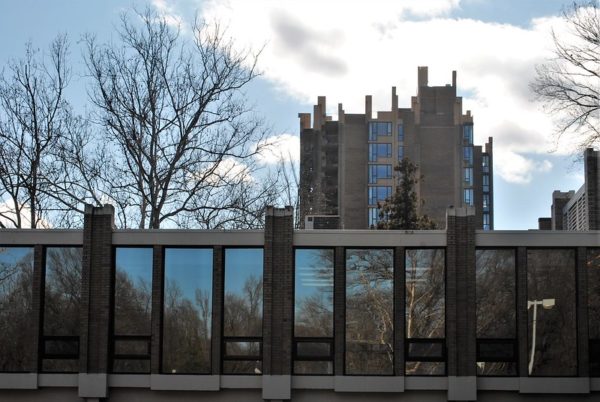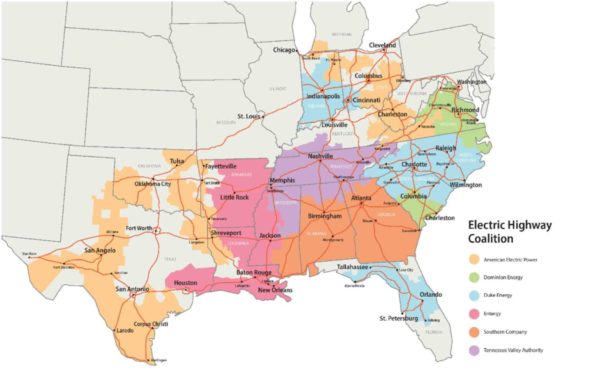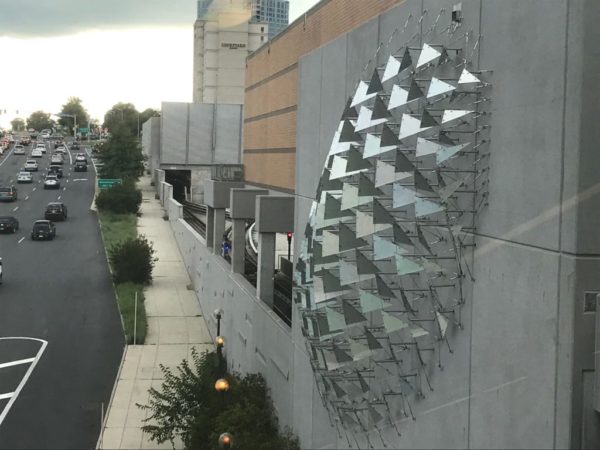Fairfax County Parks Removes Mask Requirements for Fully Vaccinated Visitors — “Fully vaccinated Fairfax County Park Authority visitors will no longer be required to wear masks. Visitors who are not fully vaccinated and children under 12 years old will be required to wear a mask except as outlined in the Virginia Governor’s Order 79.” [Friends of Frying Pan Farm Park/LinkedIn]
Metro Service Increases Proposed — Metro General Manager Paul Wiedefeld is set to propose sweeping changes to both rail and bus service at a finance and capital committee meeting today (Wednesday). Possible changes include keeping stations until midnight, instead of 11 p.m., starting this summer and increasing the frequency of both trains and buses. [WTOP]
Herndon Office Plaza Sold — New York investment firm Innovatus Capital Partners has acquired the Dulles Executive Plaza office buildings at 13530 and 13560 Dulles Technology Drive in Herndon for $113.5 million. The 384,336-square-foot complex is mostly occupied by Lockheed Martin Corp., which leases half the property through 2024, and the private security company Constellis LLC, which leases 28% of the square footage under a deal that runs through 2031. [Washington Business Journal]
Reston Construction Company to Design Gas-to-Gasoline Facility — “Nacero has awarded Bechtel the Front-End Engineering and Design (FEED) contract for the first natural gas-to-gasoline manufacturing facility in the United States. Nacero’s 115,000 barrel per day plant in Penwell, Texas…will be the first gasoline manufacturing plant in the world to incorporate carbon capture, sequestration, and 100% renewable power.” [Chemical Engineering]
Remember the U.S.S. Herndon — In the wake of Memorial Day, the Herndon Historical Society tells the story of the two U.S. Navy ships named after the Town of Herndon’s namesake, Commander William Lewis Herndon, a Navy officer who died in 1857 when his ship sank in the Atlantic Ocean at the hands of a devastating hurricane. [Patch]
Dominion Energy plans to have new electric vehicle charging stations up and running in Northern Virginia this year, joining five other utility providers to create an interstate charging network that could extend from D.C. to western Texas.
The provider announced last week that it is partnering with American Electric Power, Duke Energy, Entergy Corporation, Southern Co., and the Tennessee Valley Authority to form the Electric Highway Coalition, which will provide electric vehicle charging infrastructure along major highways within their service territories.
About 18 million EVs could be on U.S. roads by 2030, according to estimates from The Edison Electric Institute. But while charging options becoming more plentiful to support everyday travel, anxiety remains among drivers about how to tackle long-distance road trips.
Dominion wants to enable electric long-distance travel for customers and its company fleet on major interstates and other well-traveled roadways, spokesperson Peggy Fox said. The charging stations will be capable of getting drivers back on the road in approximately 20-30 minutes.
“For example, in Virginia, we want to enable EV drivers to travel from the mountains to the beach or from the nation’s capital to the Virginia coast,” she said.
New stations in Fairfax County could be along I-66, I-95 and 495, and other well-traveled roads, she added. The stations will be about 100 miles apart or less, but exact locations and a concrete timeline have yet to be established.
“The partner utilities have started discussions to collaborate on site locations, site partners, design, and equipment,” Fox said.
Dominion will be coordinating with the other utility partners to provide sufficient charging capacity while using existing infrastructure and avoiding duplication, she said. The utility company plans to have a minimum of two charging stations at each location.
It has also been working with the state and locally with Fairfax County government to electrify transit. It rolled outelectric school buses in January, and in October, it debuted a self-driving shuttle that runs between Dunn Loring Metro Station and Mosaic District.
Del. Mark Keam (D-35th), who represents part of Tysons and has supported many environment-focused bills, said he welcomes Dominion’s new partnership as a “good news story,” but the General Assembly approved a number of bills in its recent legislative session to indicate the state government is serious about electrifying transit, too.
“No company is going to go do things on their own, without knowing what the state will do as a partner,” Keam said. “Us providing that level of priority allows Dominion to say, ‘OK, here’s what we will do.'”
Virginia will join a dozen other states that have adopted clean car standards requiring low- and zero-emission vehicles to be available, he said. It will also be providing a “small but still meaningful rebate” for those looking to buy one.
Keam says Dominion’s plans could work in tandem with approved bills supporting the expansion of charging infrastructure. Legislators also requested a statewide study of transit equity, and Keam successfully introduced a bill to establish a state electric school bus fund.
“We’ve really put Virginia on the map,” he said.
Still, Keam added that Dominion’s role in electrifying transit should be an ongoing discussion. It owns substantial infrastructure and supplies much of Virginia’s power, so the utility needs to be included, but state lawmakers have been unable to agree on a regulatory approach.
“We have to look at all of this with clear eyes,” he said.
Image via Dominion Energy
What would it take for you to reduce your carbon footprint?
That’s the question Fairfax County is posing as it enters the public engagement portion of its Community Energy and Climate Action Plan (CECAP) initiative, which will establish goals and strategies for reducing greenhouse gas emissions and mitigating the impact of climate change.
Launched in early 2020, the CECAP process is being led by the Fairfax County Office of Environmental and Energy Coordination (OEEC) with support from the Metropolitan Washington Council of Governments and the Fairfax-based consulting firm ICF.
The county previously sought public input on the plan in August and September, when a CECAP Task Force started developing draft mitigation goals.
In addition to holding two public meetings last week, one focused on energy and another on transportation, waste, and development, the county is looking to gather more public feedback through a trio of short surveys.
“We want to make sure that we expand our reach and get information from as many county residents and business owners as we can,” ICF Director of Human Capital Michelle Heelan said when facilitating the energy community meeting on Feb. 23.
One survey gauges respondents’ interest in undertaking projects to make their home more energy-efficient and sustainable, like installing solar panels and replacing light bulbs and HVAC systems. Another deals with transportation and development, asking questions about public transit, electric vehicles, and mixed-use development.
There is also a more open-ended survey for people to share general comments on the CECAP initiative.
“In Fairfax County, energy use and transportation are the two greatest sources of greenhouse gas emissions,” the OEEC says. “The CECAP will address both issue areas, and with your input, we can ensure that the final plan reflects the needs of everyone in our community as we work to reduce our collective carbon footprint.”
The surveys are currently available in English, Spanish, Korean, and Vietnamese. They will be open until 11:59 p.m. on Mar. 14.
ICF will draft a final report with input from a CECAP Working Group and the community for the Fairfax County Board of Supervisors to adopt this summer, according to OEEC Senior Community Specialist Maya Dhavale.

New Tip Line Number for County Schools — Fairfax County Public Schools officially have a new text number: 888-777. All information is treated as anonymous and confidential. [Fairfax County Public Schools]
Reston Association Board Meets Tonight — The Board of Directors will meet tonight at 6:30 p.m. in RA headquarters. The meeting will be live-streamed online. [Reston Association]
Outdoor Lighting Standards Changed — “Fairfax County is updating our outdoor lighting standards to reduce glare and excessive illumination and match the expanded use of LED lights, which can improve the quality of life for county residents.” [Fairfax County Government]
Herndon Mayor Endorses Pete Buttigieg for President — Mayor Lisa Merkel announced her endorsement of the presidential candidate ahead of his town hall on Sunday, Feb. 23. In a press release, she says he’s committed to “bringing the local executive leadership to Washington and making Washington look more like best-run cities and towns.”
Photo via vantagehill/Flickr
Herndon’s Ice House Cafe set to close soon — The cafe and bar, which has been in Herndon for more than 40 years, will close its doors at 760 Elden Street. Celebrations are planned for Dec. 30 and New Year’s Eve before its Jan. 1 closing date. [Fairfax County Times]
Brookfield Properties eyes neighbors for Wegmans — The Toronto-based developer is considering different retailers for the $1.4 billion mixed-use project, which will include an 80,000-square-foot Wegmans. A bowling alley concept, movie theater, fitness center and restaurants are under consideration. [Washington Business Journal]
Man convicted for sexually assaulting four Reston roommates in 1995 — A jury found Jude Lovchik guilty on all 17 counts, including charges of sodomy, abduction and burglary. The case had gone cold until Lovchik’s ex-wife told Arlington County police that Lovchik had confessed the actions to her and had her recreate the scenes. [The Washington Post]
Clean Virginia says Dominion Energy customers pay too much — The new political action group claims that Virginians pay $254 in excess a year because of poor state oversight. [The Washington Post]
Herndon development is slated to attract larger employers — Fairfax County approved an increase to the density for part of the Center for Innovative Technology site that falls within the county for 3.8 million square feet of office space along with a hotel and retail. The campus, which is just off of the Dulles Toll Road, was once part of the county’s larger bid for Amazon’s second headquarters. [Washington Business Journal]
 This is an opinion column by Del. Ken Plum (D), who represents Reston in Virginia’s House of Delegates. It does not reflect the opinion of Reston Now.
This is an opinion column by Del. Ken Plum (D), who represents Reston in Virginia’s House of Delegates. It does not reflect the opinion of Reston Now.
Governor Ralph Northam took two significant steps last week related to Virginia’s energy future. In a word, both could be summed up as “conserving.” One action of the Governor was to announce the 2018 Virginia Energy Plan. Later in the week, he announced his signing of an executive order establishing a conservation cabinet.
The Virginia Plan makes recommendations in five areas: solar, onshore and offshore wind, energy efficiency, energy storage, and electric vehicles and advanced transportation. The goals within each of these areas are ambitious, but they are essential in shifting energy use in Virginia to a more environment-friendly direction. In a press release on October 2, the Governor is quoted as saying that “the clean energy sector has the power to create new business opportunities, expand customer access to renewable energy, and spark the high-demand jobs of the 21st century.”
Among the goals of the plan are achieving at least 3,000 megawatts of solar and wind energy by 2022, expanding net metering and community solar programs, and doubling the state’s renewable energy procurement target to 16 percent by 2022. The plan recommends that the state support Dominion Energy’s planned 12-megawatt offshore wind turbine demonstration project with a target of 2,000 megawatts of offshore wind energy by 2028.
The plan also recommends that the state-sponsored efficiency programs and financing set a 16 percent renewable procurement target and a 20 percent energy efficiency target for state agencies, moving state agencies in the direction of greater efficiencies and the use of renewable energy in a lead-by-example approach. The plan seeks also to increase the annual dollars of investments by utilities in energy efficiency programs. Recommendations also call for action to promote alternative-fuel vehicles with the development of an Advanced Clean Cars program with targets for charging stations and the state’s vehicle fleet.
The Commonwealth and utilities in the state have started efforts in many of these areas as a result of legislation passed by the General Assembly earlier this year. The plan reflects an underlying goal that the strategy not unfairly impact low-income and minority communities. Review the plan at Virginia Energy Plan.
In a separate action, Governor Northam issued an Executive Order establishing the Governor’s Conservation Cabinet, a new initiative “to better protect Virginia’s vulnerable natural resources and improve environmental quality across the Commonwealth.” The Governor stated that “this effort will strengthen our inter-agency coordination and allow us to bring all of our resources to bear in addressing environmental threats and ensuring best practices across state-driven conservation initiatives.” The initiative will seek to work with state agencies, localities, nonprofit land trusts, and willing landowners as well as partners in both public and private sectors, according to the press release announcing the Governor’s action.
Members of the Conservation Cabinet include the Secretaries of Agriculture and Forestry, Commerce and Trade, Finance, Natural Resources and Transportation. The full text of the Governor’s announcement can be found at Governor’s Conservation Cabinet.
While some will criticize state government for moving too slowly and not being bold enough in the areas of energy and the environment, I am pleased that we are at least moving in the right direction as it relates to Virginia’s energy future.
File photo
 This is an opinion column by Del. Ken Plum (D), who represents Reston in Virginia’s House of Delegates. It does not reflect the opinion of Reston Now.
This is an opinion column by Del. Ken Plum (D), who represents Reston in Virginia’s House of Delegates. It does not reflect the opinion of Reston Now.
While many of us express concern that we do not see as many solar collectors on Virginia roof-tops as we would like, the Commonwealth is showing significant progress on turning sunlight into electrical energy. As with any major change there are some hazy areas that need to be considered as well.
According to the Solar Energy Industries Association (SEIA) as reported in the August 2018 issue of Virginia Business magazine, Virginia currently ranks 17th nationally with 631.3 megawatts of installed solar capacity. The ranking is a significant jump from 2016 when the state ranked 29th nationally. Even with the advanced standing, only 0.59 percent of the state’s electricity comes from solar. By way of contrast, North Carolina is second in the nation in installed solar capacity with 4,412 megawatts brought about by generous tax incentives. For North Carolina that is nearly five percent of their electricity supply.
Virginia’s future with solar appears bright with 59 notices of intent with the Department of Environmental Quality to install 2,646 megawatts of solar according to the Virginia Business article. Driving the expansion of solar energy is a sharp drop in price from $96 in 1970 to 40 cents per kilowatt this year and an insistence on the part of technology giants like Amazon, Microsoft, Google and Facebook, all of whom have a presence in Virginia, that their electric power come from solar systems. The Grid Transformation and Security Act passed by the General Assembly this year requires 5,000 new megawatts of solar and wind energy to be developed. Included in that total is 500 megawatts of small, roof-top panels.
Middlesex County Public Schools opened this year with two of its three schools powered by solar energy. Although a small, rural school system, Middlesex has the largest ground-mounted solar system of any school division in the state and is expected to save over two million dollars per year. Excess electricity generated is sent to the grid for credit for any electricity the schools takes from the grid at night through a net-metering arrangement.
Some shadows along the way can be expected with such a massive shift in the way electricity is produced. It takes about eight acres of land for each megawatt produced. Solar farms take up large amounts of land. Just last week the Culpeper County Board of Supervisors voted to deny a conditional-use permit for a 178-acre utility scale solar facility in the County. The supervisors indicated that they had questions about the project for which they did not receive adequate answers. One factor is likely to have been the results of a study by the American Battlefield Trust that indicated the project would be visible from some of the half-dozen signal stations around Culpeper County that were used during the Civil War to detect troop movement. The County depends on a high level of tourism based on its Civil War battlefields and apparently does not want to jeopardize its attraction to Civil War buffs.
The clouds will pass, and Virginia is on its way to a bright future with solar energy.
File photo
Silver Line pleads guilty to falsifying concrete tests — A contractor admitted to falsifying concrete quality tests for stations on the Silver Line extension to Dulles International Airport last week. The contractor, Andrew Nolan, 28, pleaded guilty to conspiracy to commit wire fraud and faces up to five years in prison. [The Washington Post]
LED lights the way — Fairfax County has entered into a new regional agreement with Dominion Energy that would convert existing streetlights into more energy-efficient LEDs. The company installs, owns and maintains most of the nearly 58,000 streetlights in the county. [Fairfax County Government]
Commuter alert: Lane and ramp closures — A number of lane and ramp closures are effect in Reston and surrounding areas, including Herndon Parkway, Sunrise Valley Drive and Sunset Hills Road through Aug. 11. [Dulles Corridor Metrorail Project]
Photo by Mike James
 Fairfax County residents will be able to solarize their houses at discounted rate this month, thanks to Solarize NOVA.
Fairfax County residents will be able to solarize their houses at discounted rate this month, thanks to Solarize NOVA.
Throughout the month of June, Solarize NOVA will provide free solar assessments to home and business owners. Reston residents have the chance to learn more at an information session Thursday, June 22 at 7:30 p.m. at the North County Governmental Center (1801 Cameron Glen Drive).
The program, sponsored by the Northern Virginia Regional Commission and the Local Energy Alliance Program, helps residents learn about solar energy and helps with the discounted installation of solar panels.
Solarize NOVA will waive permit fees for installation. Homeowners with solar panels are able to receive a 30 percent federal tax credit and a credit on real estate taxes in Fairfax County.
 Kids and their families can learn about sustainability while having fun on the farm at the annual Northern Virginia Sustainability Fair on Saturday, Sept. 13 at Frying Pan Park in Herndon.
Kids and their families can learn about sustainability while having fun on the farm at the annual Northern Virginia Sustainability Fair on Saturday, Sept. 13 at Frying Pan Park in Herndon.
The free event runs from 10 a.m. to 3 p.m.
The fair is sponsored by the The Three Birds Foundation, a nonprofit that “develops renewable energy initiatives that engage and inspire students, thus creating a culture of curiosity and environmental stewardship.” The fair is part of the Green Apple Day of Service, a worldwide initiative that is dedicated to growing the green schools movement, says the Three Birds Foundation.
Bring a picnic lunch or purchase food from Gordon’s Grill. There will be free wagon and carousel rides all day.






